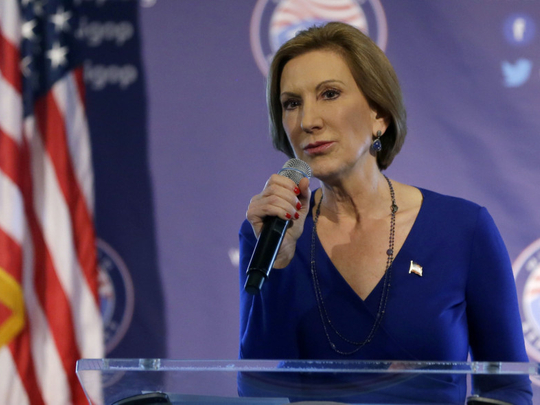
Carly Fiorina likes to say, “Leadership is not about how big your position or your title is, it’s not about how big your office is, it’s not about how big your airplane, your helicopter, or your ego is. Leadership is about service.”
She also makes the case that while she has not held a public-sector job, she is nevertheless qualified. (“I understand how the economy works,” she said. “I understand how the world works and who’s in it, who are our friends, and who are our enemies; I understand how big bureaucracies work - which is what Washington has become; I understand technology; and I understand leadership.”)
In making a credible run for president and making it onto VP shortlists, she is not merely showing she was underestimated. (She says she has been underestimated her whole life.) She is redefining what it means to be an outsider and how we think of presidential skills.
Until now, Republican outsiders have been tagged, sometimes correctly, as undisciplined, unschooled and unaccustomed to dealing with the mainstream media. We saw these sorts of rebels run for Senate in 2010, 2012 and 2014 (Sharron Angle, Christine O’Donnell, Joe Miller, Matt Bevin, etc.) and for president in 2012 (e.g., Herman Cain). Republicans were put in the position of defending marginal candidates from very legitimate scrutiny and criticism. Carly Fiorina is not that sort of outsider.
She may not be experienced in government, but she is expert at dealing with the media, reeling off concrete foreign policy proposals, thinking on her feet and doing other tasks that for better or worse have become the skills candidates need to be elected. We can question whether that skill set has anything to do with being a good president (President Obama suggests they are totally unrelated), but after creating a media feeding frenzy that assesses candidates on verbal dexterity and lionizing an eloquent but under-qualified Obama in 2008, liberal elites are in no position to claim that Fiorina is not presidential timbre.
In short, Fiorina, by any definition, is showing you don’t have to have held office to run for president. (We will get to being president in a moment.) Poise, intelligence, wit, confidence and tenacity are not defined by one’s resume - it’s not about how big your position or your title is, it’s not about how big your office is, but about skills that can be polished in any number of professions. (Yes, Fiorina did run for the Senate, but no one would call her a professional politician.)
The right time
Well, if Fiorina has shown that a non-politician can be an able presidential candidate, can she convince Americans that a non-politician can be an able president? You have to go back to Dwight D. Eisenhower to find a president who never held political office, but his command of Allied Forces was the closest one can come to being commander in chief. Before that, William Howard Taft served only in appointed positions (solicitor general, judge, secretary of war, etc.) but still served in government capacities. Fiorina asks us to accept that her executive experience is transferable, her subject-matter expertise is high and she can learn the rest (e.g., the art of haggling with Congress, the ability of permanent civil servants to undermine an administration, the fine points of entitlement programmes).
In most eras, this would be a stretch, but Fiorina picked the right time to test her proposition. For one thing, Obama lacked executive experience and barely touched down in the Senate. Liberals extolled his “judgment” and “temperament.” Having lowered the bar, liberals yet again are hard-pressed to make the case that you have to be a lifetime government official to govern. (Conservatives, by contrast, would argue that Obama’s problems relate not so much to his tenure in the public sector but to his bad ideas, poor interpersonal relationships and contempt for those who don’t come under his spell.) More important, given the high degree of scepticism about professional politicians and governing institutions as well as rampant dysfunction (e.g., shutdowns, stalemates, incivility), the public figures that being a Beltway veteran is a detriment to good governance. There is also something to be said for the myopia of politicians who are entirely ignorant about the private sector.
Certainly the “find a novice” sentiment can be naive. It, for one thing, ignores major policy differences that are at the root of stalemates. But it is not such a daunting leap of faith if the political novice is a sophisticated grownup, hardened by corporate battles and knowledgeable about the world. If you are going to bet that a real outsider can govern, Fiorina is a reasonable risk.
We will see how far she goes, but already she is teaching the conservative base a lesson: If you want to knock down the establishment barricades, find a polished and plausible executive, not an ideological extremist, a bully or a provincial know-nothing.
— Washington Post









